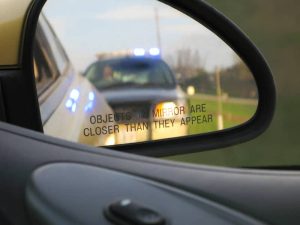Field sobriety tests (FSTs) and Standardized Field Sobriety Tests (SFSTs) are common tools law enforcement officers use to  determine if a driver is driving under the influence of drugs or alcohol.
determine if a driver is driving under the influence of drugs or alcohol.
These tests are designed to measure a driver’s physical and cognitive abilities, and assess their level of impairment.
If an officer suspects that a driver is impaired, they may ask them to perform one or more FSTs as part of a DUI investigation.
Field Sobriety Tests may include tests such as the:
- One Leg Stand Test
- Walk and Turn Test – Heel to Toe
- Horizontal Gaze Nystagmus Test
This article reviews and explains the most common types of FSTs used in DUI investigations, pursuant to National Highway Traffic Safety Administration (NHTSA) “verification” studies, in North Carolina.
Horizontal Gaze Nystagmus Test – HGN Test
The HGN test is designed to detect an involuntary jerking of the eyeball, which may be an indicator of alcohol consumption.
An officer will ask the driver to follow the police officer’s finger, pen or flashlight.
Impact of DWI charges in North Carolina
With the horizontal gaze nystagmus test, the person being tested is instructed to follow the “stimulus” with their eyes only, without moving their head.
Sobriety tests are only as good as the police officers who administer them – John Fanney, Raleigh DUI Lawyer
The police officer watches signs of jerking or twitching or “lack of smooth pursuit.”
The HGN test (of the three standardized sobriety tests) is considered to be one of the most reliable FSTs for detecting alcohol impairment.
Walk-and-Turn Test (WAT)
The “Heel to Toe” test (also known as the Walk and Turn Test) is one of the three tests that have been “verified” by the National Highway Traffic Administration NHTSA.
The walk-and-turn test requires the driver to walk nine steps in a straight line (on a real or imaginary line), turn on one foot, and return nine steps in the opposite direction.
This test is designed to measure a driver’s balance, coordination, and ability to follow instructions. An officer will look for signs of swaying, stumbling, or losing balance during the test.
One-Leg Stand Test (OLS)
The one-leg stand test requires the driver to stand on one foot for a period of time, typically 30 seconds, while counting out loud.
This test is designed to measure a driver’s balance, coordination, and ability to follow instructions. An officer will look for signs of swaying, hopping, or putting their foot down to balance.
7 reasons why you should hire a DUI lawyer
It is important to note that FSTs are not infallible and can be affected by a wide range of factors such as the driver’s physical  abilities and the roadway conditions and incline.
abilities and the roadway conditions and incline.
You can refuse the test if you are asked to perform field sobriety tests and believe you may not pass due to underlying conditions or circumstances.
However, refusing an FST – Field Sobriety Test could result in the police officer finding Probable Cause to Arrest and charging the driver with DUI in North Carolina.
If you have been arrested for DUI or charged with a DUI-related offense, speaking with an experienced DUI defense attorney in Raleigh can help you understand your legal rights and options.
Do you need a lawyer for DWI charges in NC?
While not required to hire a criminal defense lawyer in Raleigh, we think going into court by yourself (pro see) puts you at a tremendous disadvantage.
The DWI lawyers at Fanney Law Firm can help you understand the legal process, your rights, the penalties and consequences of a DWI conviction, and what defenses may apply.
Don’t take chances with something as serious as a DWI charge – call us today. Contact Fanney Law Firm if you or someone you know has been charged with DWI in Raleigh, North Carolina.
Are you required to provide ID?
Our dedicated, experienced attorneys are here to help you every step of the way, helping ensure your rights and interests are protected throughout the legal process.
Call us today for a free consultation. We’re here to help
Can I get a Hardship License? Limited Privileges in NC
If you have been charged with DWI, you may be eligible for a Limited Driving Privilege (LDP) or “hardship license.” A hardship license is a special restricted driver’s license issued by a Judge and transmitted to the North Carolina Department of Transportation / Division of Motor Vehicles (NCDMV) that allows individuals to drive during certain times and under specific conditions.
How much does it cost to hire a DUI lawyer in Raleigh?
The cost of hiring a DWI lawyer in Raleigh can vary widely, depending on the experience and reputation of the attorney.
Generally speaking, attorneys with more experience tend to charge higher fees for legal services than those with less courtroom and trial experience. I have been licensed to practice law in North Carolina for more than thirty years and have substantial, practical courtroom experience in Raleigh – John Fanny, Wake County DUI Lawyer
Can you go to jail for a “DWI First” in North Carolina? 
Even if you’ve never had a DWI before, you can still go to jail for a first-offense DWI conviction in North Carolina. The length of the sentence depends on several factors, including grossly aggravating factors and aggravating factors, such as having a minor in the vehicle or causing an accident that results in serious injury.
Are there any alternatives to jail in North Carolina?
Yes, depending on the circumstances of your DWI charge and the availability of certain programs, you may be able to avoid jail time. The Court (the Judge) will consider statutory Mitigating Factors before imposing judgment. Those may include a safe driving record, prior substance abuse assessment, and completion of any recommendations made by the assessing agency.
Is the Finger to Nose Test reliable?
No. The Finger to Nose Test is not considered a reliable field sobriety test. Years ago, the Finger to Nowe was used by police officers, in addition to the three tests (HGN, OLS, and WAT), to determine alcohol impairment. The results of the Finger to Nose test are highly subjective. They can be affected by various factors, such as the officer’s training (or lack thereof), lighting conditions, and even the driver’s dexterity. The Finger to Nose is not recognized as a standardized field sobriety test (it is not “verified”) by the National Highway Traffic Safety Administration NHTSA.
Is the Chemical Test reliable? Non-Standardized Tests
Standardized field sobriety tests such as roadside tests like the one-leg stand test, heel-to-toe, and horizontal gaze nystagmus are often conducted with the breath and blood tests. the police officer, in addition to checking for physical impairment, may use other non standard tests and divided attention tests to determine impairment. That may include other sobriety tests like requesting the driver to say their ABCs or counting backward. As you might imagine, non-certified field sobriety test results are not scientifically proven. The roadside AlcoSensor test is reliable to confirm the presence of alcohol. The numerical reading on the AlcoSensor FST is not admissible as evidence during pretrial motions challenging Probable Cause or during the Reasonable Doubt phase of a DUI trial.
 North Carolina Criminal Law Updates
North Carolina Criminal Law Updates